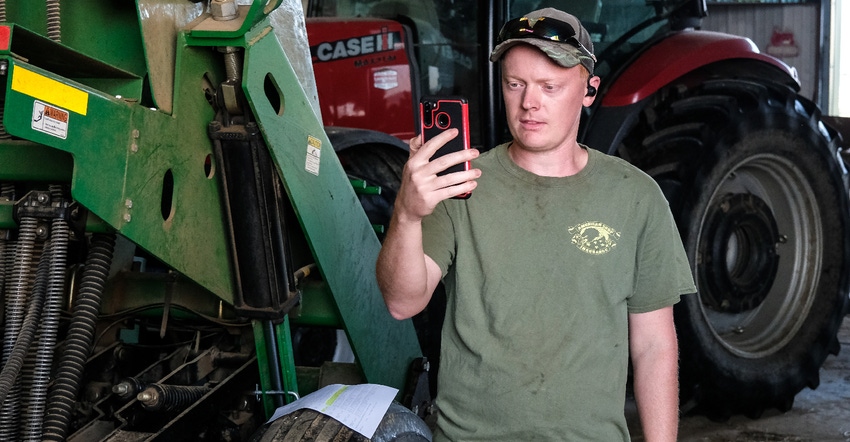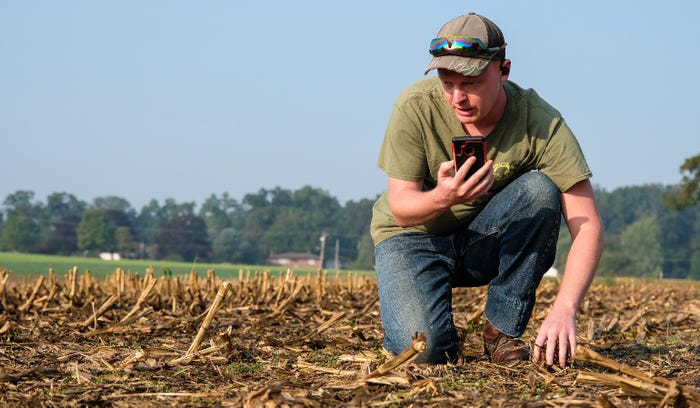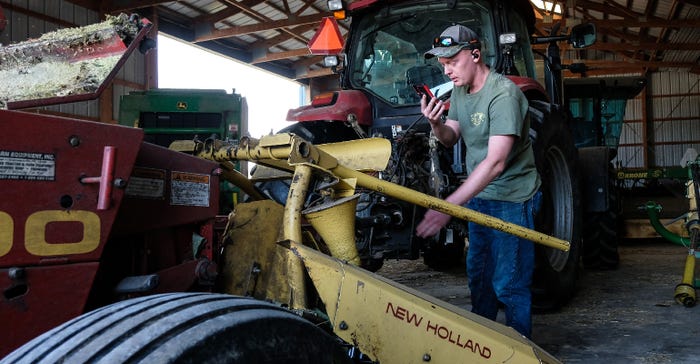
It was at an August meeting of the Butler County Farm Bureau board of directors when dairy farmer William Thiele first heard of Mary Jo Ross, a faculty member in the hospitality, event management and tourism program at Slippery Rock University.
Ross was looking for a farmer who could talk to students going into the hospitality industry. The idea was to better connect students with how food is grown on a farm.
Thiele, a member of the Farm Bureau board, thought of several farmers who might be interested. But in the end, he knew of someone who would definitely be on board with the idea: himself. But how do you bring college students to the farm during a global pandemic? That’s the beauty of modern technology.
Using his smartphone and Zoom, Thiele brought the farm to the students. He even came up with a catchy name for his lesson: Farmer Fridays. Since August, he’s taught eight classes, taking his phone around the farm and letting students get a virtual tour.
From soil to tank
Most people have heard of “farm to fork” in the context of educating people about farming, but Thiele has taken it a step further, starting from planting all the way to milking.
His first talk was on soil health, showing the students why his farm no-tills and spreads fertilizer. He showed them soil tests from Penn State Extension and explained the differences in soil pH and other soil health factors.

The very first class Thiele conducted in August focused on soil health. His goal was to show the process of dairy farming, from soil testing and planting crops all the way to milking.
Thiele's second talk was on cover crops, followed by a talk on machinery; the type of feed dairy cows eat; a demonstration of his drone; cow health and comfort; and finally, a talk about the farm’s milking process.
“All that stuff that I talked to them about, the machinery and other things … it all comes down to the end product, which is the milk, so that was the last one I did,” he says. “It was great, especially with COVID nowadays. Whenever I saw I could do it on my phone, I said, ‘Well, that sounds easy to me.’”
Easily adaptable
At 27, Thiele has become adept at learning new things and helping his family adopt new practices.
He and his family, including his brother, run a 300-acre, 40-cow dairy just north of Pittsburgh in Cabot, Pa. The farm has been in his family for 152 years, and he and his brother are the sixth generation.
The age of the farm shows. The family still milks in a tie-stall barn that was built in 1864. They milk the cows using six Milk Master units; the process takes about 90 minutes to finish.
They grow more than enough feed for the cows, and even grow some shelled corn and soybeans that they sell on the side. Milk goes to Marburger Farm Dairy in Evans City, Pa.
But while the facilities are older and less modern compared to other dairy farms, the family is ahead of the game when it comes to field practices.
They’ve experimented with no-till and cover crop mixes in the fields. The past couple of years, they’ve started planting green, the process of planting a field crop into a growing cover crop in mid-spring and then rolling down the cover crop down later.
“If you don't try new things along the way, eventually the past is going to run you all over," Thiele says.
Learning and educating
Thiele liked his experience so much that he’ll be teaching the class again on Fridays next semester, which starts in January.
He says that he liked the interactive question-and-answer sessions with his students and didn’t mind answering questions like how much feed the silos hold, or how much feed a cow needs to eat. It’s not a formal class, so he doesn’t give out quizzes or tests. But he hopes the students got something out of it.
“I think it’s how interested the students really are about it. I think a lot of them came into it thinking that farms did it one way or another, but this really opened their eyes,” Thiele says. “The students were just amazed by how much prep work is involved. Like there’s a lot of people out there that think all farming is easy; you just drive a tractor around and pitch some hay to some cows, and that’s it. It’s a lot more involved than that."

Another one of the classes focused on machinery and what types of iron Thiele uses to spread manure, plant crops and harvest.
He also learned, too, about things he can better teach other people about his farm and agriculture in general, and what other farmers can do.
“I guess we as farmers have to always educate the public," Thiele says. "We don’t want to think of them as not knowing anything. But then again, they know a little bit but not enough. It’s our job as farmers to educate people."
If other colleges want to do something similar, he’s game to help them start.
“We need to continue to adapt and continue to do that," Thiele says. "If more people catch on to doing something like this, then it’s a whole ’nother way to educate people. I know there is social media and everything. … It’s a lot. But for young people, you can easily adapt to it.’
Read more about:
Covid 19About the Author(s)
You May Also Like






